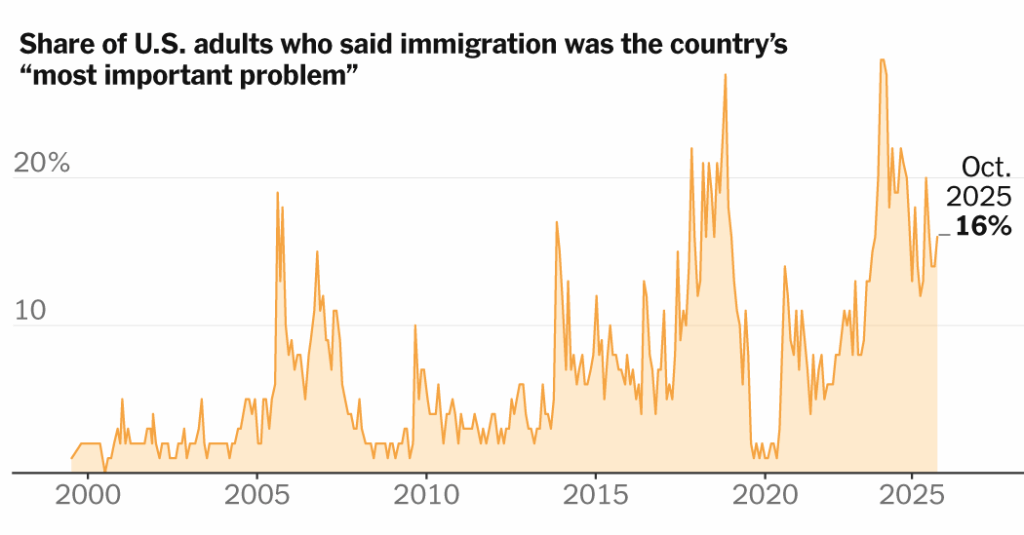Since 2015, Americans have consistently named immigration as one of the most important issues facing the country. For several months during the 2024 presidential campaign, it reached the top of the list, surpassing worries about the economy, according to polling by Gallup, as the issue became central to Donald J. Trump’s campaign.
The issue is often presented as an intensely partisan one. But when looking more deeply at attitudes on immigration, sentiment can vary widely based on the details included in specific poll questions, reflecting the complexity of the issue.
Here is what a New York Times review of recent polls of the general public — which primarily measure attitudes among U.S.-born citizens but include representative shares of immigrants — have found about how Americans feel about immigration and immigrants.
Concern about immigration has spiked in recent years.
Increases in the share of Americans who cite immigration as the nation’s most important problem have followed increased focus on immigration in politics and the media. Often, that attention has focused on attempts to illegally cross the southern border, such as when caravans of migrants marched toward the U.S.
This concern is largely driven by Republicans, who are more likely than Democrats to cite immigration as a major problem.
Ahead of the 2024 election, concern about immigration reached its highest-ever point since Gallup began asking the question 25 years ago. Mr. Trump was more widely trusted to handle immigration than President Joseph R. Biden or Kamala Harris, the eventual Democratic nominee.
Americans are more likely to approve of Trump on border security than on immigration overall.
Americans’ approval of Mr. Trump’s “handling of immigration” stands at about 45 percent. That is a bit higher than his overall job approval rating, which has been hovering in the low 40s.
But when polls mention “border security,” approval tends to be higher. In a Marquette Law School poll taken this month, more than half of Americans — 54 percent — said they approved of Mr. Trump’s handling of “border security” — nine percentage points higher than the share who approved of him on “immigration.”
For many,“border security” emphasizes safety and the enforcement of boundaries, whereas “immigration” centers more directly on the people involved. Some may approve of strict border enforcement as a security measure yet feel more conflicted about policies that affect individuals who are already in the U.S.
Americans have also become more receptive to some of the core tenets of Mr. Trump’s immigration policy. In 2016, a majority of voters were opposed to building a wall along the U.S.-Mexico borer, according to polling from Quinnipiac University. By 2023, a majority of voters were in favor of it.
Support for deportations varies significantly based on who is being deported and where.
About half of Americans support the broad idea of deporting undocumented immigrants back to their home countries, according to polls from The New York Times and Siena University and Marquette Law School.
But support for specific aspects of the Trump administration’s plans can be far higher or lower depending on the details of the poll question.
Polls find near-universal support for deporting immigrants who arrived in the country illegally and have criminal records.
But less than a third of Americans favored deporting undocumented immigrants to “foreign prisons in El Salvador, Rwanda, or Libya” in a P.R.R.I. poll taken from August to September. And there is little support for the idea of deporting immigrants who are in the country legally.
Most Americans say immigrants strengthen society. This was not always the case.
Americans generally have a positive view of immigrants. But that’s a relatively recent development.
Three decades ago, nearly two-thirds of U.S. adults said they thought immigrants burdened the country and only 31 percent thought immigrants strengthened it, according to Pew Research Center. By the 2000s, views were more evenly divided, and by 2019, most Americans thought immigrants were a benefit.
One factor driving that change is the extent to which views on immigration, which did not used to be tied to support for a party, has become a partisan issue, causing Democrats in particular to become more supportive. In a poll conducted by The New York Times and Ipsos in January, just 30 percent of Republicans said immigrants strengthened the country, compared with more than 80 percent of Democrats and 56 percent of Americans overall.
Opinions of legal immigration are becoming more positive.
While much of the focus in politics and the media has been on illegal immigration, most immigrants in the country arrived legally. And views of legal immigration are generally favorable — and have become more so over the last two years.
Immigrants who are in the country legally are seen as far less “risky,” with just 25 percent of Americans feeling that there is a “major risk” of them committing crimes, compared with 37 percent believing there is a major risk for immigrants who arrived illegally, according to a September poll from The Associated Press and NORC.
These distinctions extend to perceived benefits. Americans are more likely to say immigrants provide a “major benefit” to society when asked about legal immigrants than when asked about immigrants who arrived illegally.
Perceptions of the benefits from legal immigrants rose across the board between March 2024 and September 2025, according to A.P.-NORC polls, even as opinions of the benefits that illegal immigrants may offer generally became more negative.
That change in attitudes extended to another notable finding: More Americans favored increasing legal immigration than reducing it, the September poll found, a reversal from surveys from 2019, 2021 and earlier this year. And the shift in attitudes appeared to be bipartisan, even as Republicans were still more than twice as likely as Democrats to support reductions.
Research was contributed by Alex Lemonides.
Ruth Igielnik is a Times polling editor who conducts polls and analyzes and reports on the results.
The post How Americans Feel About Immigrants and Immigration appeared first on New York Times.




